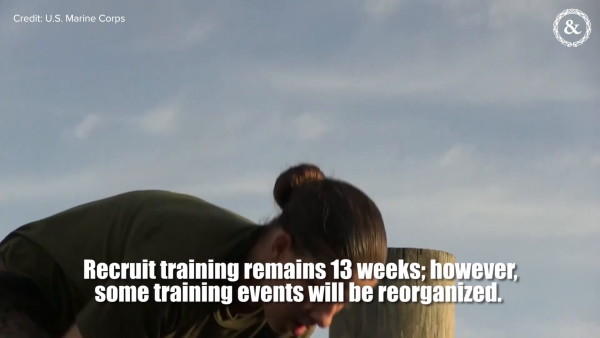

Male and female Marine recruits could once again train together at Parris Island next year, said Lt. Gen. David Berger, who has been nominated to be the Corps’ next commandant.
On March 29, the male and female Marines in India Company, 3rd Recruit Training Battalion graduated from Parris Island. The company had one female platoon and five male platoons, marking the first time the Marine Corps had integrated men and women into the same training unit.
Overall, India Company did “very well” in terms of how recruits performed physically and how many were injured, Berger said at his confirmation hearing on Tuesday.
“The statistics … for this company were the same as every other company – a few areas higher, a few areas lower, but it went great,” Berger told Sen. Joni Ernst (R-Iowa). “The program of instruction that we use in the Marine Corps didn’t change. We just changed where they were billeted, and it all worked out.”
Berger also said he has spoken with current Marine Corps Commandant Gen. Robert Neller about the possibility of having another gender-integrated training company go through boot camp next year.
“He said, ‘Absolutely,'” Berger recalled. “So, I think it’s a discussion he and I will have and the Marine Corps will have.”
When Corps officials initially announced that India Company would have both male and female platoons, they made it sound as if it were a one-off event, saying that since only about 50 female recruits were at Parris Island for that cycle, it was not enough to stand up a full staff at the 4th Recruit Training Battalion, the Corps’ female training unit.
It is unclear when male and female recruits could train together again. There are no plans to have gender-integrated training companies go through boot camp before the end of the fiscal year in September, according to Marine Corps Combat Development Command, in Quantico, Virginia.
“Although the previous decision was made by leadership in support of training efficiency, Marine Corps Recruit Depot Parris Island will continue to assess the results of India Company’s training and future opportunities that may permit this company training model,” MCCDC said in a statement on Tuesday.
One takeaway from India Company’s experience is how important individual platoons are during recruit training, the statement says.
“This company’s performance demonstrated the platoon model as the proven and ideal method for making Marines,” according to MCCDC.
See Lt. Gen. Berger’s entire exchange with Sen. Ernst below:
Q: Gen. Berger, just very briefly, because I have one minute left, earlier this month the Corps concluded an experiment integrating female recruits into an all-male unit for their initial training at Parris Island. Can you just give me a quick overview; and if confirmed, based on those results, would you pursue further gender integration during Marine Corps basic?
A: That company graduated a few weeks ago. It started with about 50 females as part of the company as you’re probably aware, ma’am.
We measure the same things in every company that goes through there: How well they did physically; how many injuries they had; all of those sorts of things.
The statistics – to answer immediately your question – for this company were the same as every other company – a few areas higher, a few areas lower, but it went great. The program of instruction that we use in the Marine Corps, we didn’t change. We just changed where they were billeted, and it all worked out.
I talked to the commandant this morning about it and the results of it. What I asked him is, I said: You know, we have to look at this, perhaps, for next year.
He said, ‘Absolutely.’ So, I think it’s a discussion he and I will have and the Marine Corps will have but the class that entered in January and graduated a few weeks ago did very well.
